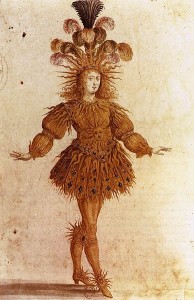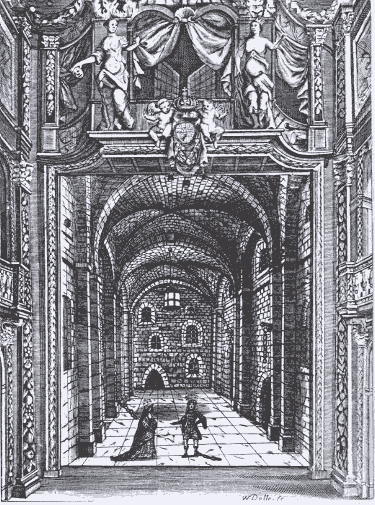On February 23, 1653, Louis XIV stepped onto Paris’s largest stage, a tall figure in a glittering, jewel-encrusted costume. A headpiece with a golden sunburst flared around his handsome head. He was fifteen years old and already one of the most powerful men in Europe.
He was about to dance in Le Ballet de la Nuit (Ballet of the Night), which had already gone on for thirteen hours. But he was the finale. The long night was over. Louis, as Apollo, god of light and music, would banish it.
The young king took his pose and started his solo. It was a moment heavy with symbolism. After a decade of discord and civil war, the king was taking charge. A new dawn was breaking in France, and Louis was its sun. The shoulder-to-shoulder Parisian crowd got the message. “Vive le Roi!,” they shouted, over and over. The Sun King was born.
From then on, Louis had the Sun King as a nickname and he used it for all it was worth. Louis XIV almost certainly loved music and art for its beauty. But he also respected it for what it could do for him, just as it had that day in 1653.

Art and propaganda have rarely enjoyed a more fruitful conjunction. While Louis’s armies were winning on Europe’s battlefields, his music conquered its stages and concert halls. Tempesta di Mare’s upcoming show, Apollo at Play: Lully and His Musical Legacy performs some of what played all across Europe for the glory of France.
Through most of his reign, Louis championed the arts and kept tight hold on them, too. He could not have found a better deputy than Jean-Baptiste Lully to drive his music program. Louis was fifteen when they met and Lully was twenty one, common, poor, and very, very ambitious. With the king’s favor, Lully defined French musical culture and controlled it for decades.
Art and propaganda have rarely enjoyed a more fruitful conjunction. While Louis’s armies were winning on Europe’s battlefields, his music conquered its stages and concert halls.
What J.-B. Lully approved became the lingua franca of French music and everybody in Europe who aspired to Louis-like greatness, or at least the appearance of it, had to have it. Soon the entire continent and, of course, the British Isles and colonies, were gliding and lilting, bowing and courtseying to French dances like chaconnes, gavottes, menuets, and gigues.
Lullian musical entertainments such as his comédies-ballets, which included singing, dancing and spoken word, took off like gangbusters. They were easy to understand (unlike Italian opera, as French detractors pointed out) and beautifully tuneful. Plus, there were costumes to die for and big ensemble numbers with exciting opportunities for dancing and stagework. To put on extravaganzas in the French manner, theaters all over Europe invested in brand-new French stage technology. Drops and borders, rolled canvas backdrops and scenery that moved invisibly by pulley systems plunged audiences into make-believe the like of which they had never been seen before.
Tempesta di Mare’s program gives a taste of Lully at home and abroad. Lully himself is represented by his music for Le Bourgeois gentilhomme, a perfect foil to Molière’s brilliant comedy and wordplay. Lullian orchestral suites go to the provinces with Lully’s German student, Johann Sigismund Kusser, who took the glitter of Apollon enjoüé into the court of Ansbach in Bavaria. Lullian ballet music even time-travels, with Tempesta’s version of Igor Stravinsky’s Apollon Musagète, 1928.

And in London, French-style opera flourished during Charles II’s triumphant return to the throne after exile in France. Matthew Locke’s opera Tempest, Or The Enchanted Island, a version of Shakespeare produced at London’s brand-new, fully-rigged Dorset Garden Theater, was a special-effects blowout even in the competitive field of English restoration theater spectaculars. The opening scene alone required a shower of fire, a “tempestuous sea in perpetual agitation” and “several Spirits in horrid shapes flying down amongst the Sailors.” And Ariel flew—a lot.
The success of the Locke production is confirmed by a competing theater’s immediate parody (to draw off attendance), The Mock Tempest, Or the Enchanted Castle. In the parody version, Ariel doesn’t say, “where the bee sucks, there suck I.” He says, “Where good ale is, there suck I.”
Not exactly Apollonian. But it was probably very classy beer.
